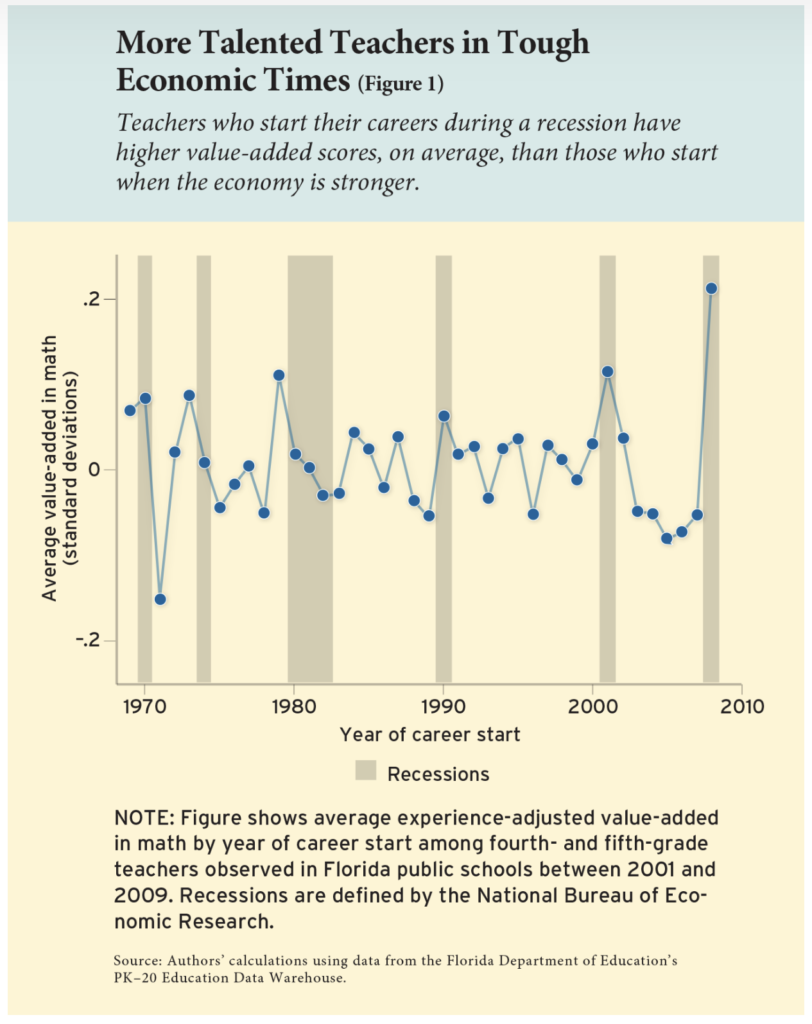COVID silver lining? Study finds pandemic may improve teacher quality

While the coronavirus recession has caused many disruptions to education, a recent study may have found a silver lining—improved teacher quality.
Harvard University Professor Martin R. West and his colleagues Markus Nagler and Marc Piopiunik studied more than 30,000 public school teachers in Florida and their students to identify whether economic recessions and job market challenges in the broader economy impact teacher quality. What they found is that individuals who enter the teaching profession during a recession are “significantly more effective at raising test scores.”
Weaker job markets offer a window of opportunity to hire stronger teachers.
The effects are most pronounced in math, where teachers who enter the profession during a labor-market downturn are 0.11 standard deviations more effective than those who start teaching when the economy is strong. That amounts to an additional $770 in lifetime earnings, on average, for each student taught by a teacher entering during a recession, or $13,000 cumulatively over a lifetime for the average class size of 17 students. The good news is that many of these teachers tend to stay in the classroom, providing high-quality teaching for many years to come.
So, even if these new teachers went into teaching because of temporary economic downturns, the study’s data show many chose to remain in the profession even after the economy turned around. “It also confirms,” the authors add, “that our overall finding that recession teachers are more effective is not an artifact of a higher rate of attrition among recession teachers.”
The study focused on fourth- and fifth-grade public school teachers in Florida who entered the profession between 1969 and 2009, a time period that included six recessions. When a recession hits, West and his colleagues found, the teaching sector becomes more attractive because “unlike private sector wages, teacher pay is rarely cut during recessions” and “the pace of hiring typically does not slow.” (With the Great Recession of 2008 being noted as an exception.) Other economic conditions, such as unemployment rates, were also analyzed and had strong correlations with teacher effectiveness as well.
The researchers wanted to limit the sample of teachers to fourth- and fifth-grade educators because they typically teach all subjects—accounting for most of a student’s total instruction time—and could therefore be “confidently associated with students’ test-score gains.” That gave them a total of around 32,600 teachers, 5,200 of whom entered the profession during a recession.
Florida was the focus of the study for a couple of key reasons. First, its alternative entry routes into teaching are typical of the 44 other states with approved alternative teacher preparation programs. Second, because much of Florida’s teaching workforce is from out of state, “the pool of potential teachers for Florida public schools is national in scope, and therefore apt to be influenced by nationwide, not state-specific, economic conditions.”
What this means for school districts
Even before COVID, many school district leaders expressed budgetary concerns. But there is an opportunity here, according to West and his colleagues, for schools to respond to the challenges of the coronavirus “in a way that benefits students over the long haul.”
Given the health-related restrictions schools are likely to face when they reopen, school districts may have no option but to do some hiring. Class-size limits aimed at ensuring social distancing will necessitate additional teachers. And some unknown number of experienced educators—especially among the 18 percent of U.S. teachers who are over the age of 55 and therefore more vulnerable to Covid-19—will be unwilling to enter the classroom. Such teachers may welcome early retirement incentives, which would in turn free up space for new recruits.
Recessions may be painful in the short term, but they also can serve as an opening to hire more effective teachers.